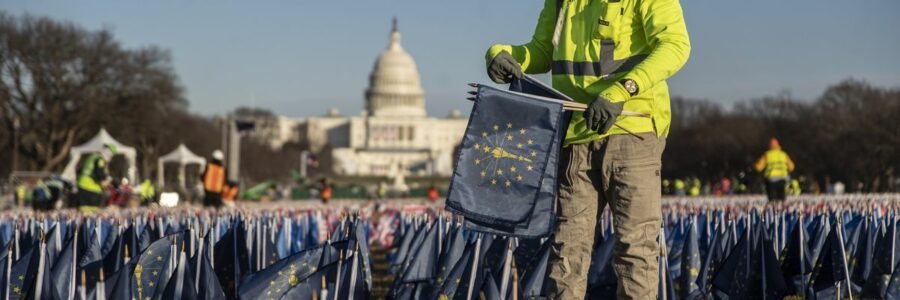
What the Capitol Riot and Inauguration Lockdown Cost the City of D.C.
After most presidential elections, the inauguration is a bonanza for Washington, D.C.’s businesses. Galas and parades, to say nothing of the big event itself, bring a crush of reservations for hotels and restaurants downtown, with economic benefits spilling over to neighborhoods across the city.
The inauguration of President Joe Biden was different, of course, marked by amilitary presence reminiscent of a Civil War scene. Security measures implemented in the wake of the Jan. 6 attack on the U.S. Capitol and maintained through the inauguration came at a cost to downtown businesses, who bore the full brunt of a near-total lockdown. With plans to keep areserve force of some 5,000 National Guard troops in the city through mid-March, even the low bar for pandemic-era normal seems like a ways off for downtown D.C.
How big was the economic blow that the city received due to fears of a Jan. 6 reprisal? While it will take some time to come up with a final tally, the Downtown D.C. Business Improvement District is estimating a nine-figure loss. “From the pandemic point of view, the city is out $100 million-ish from the normal inaugural bump,” says Gerry Widdicombe, director of economic development for the Downtown D.C. BID.
The economic impact of a normal presidential inauguration falls into two categories. There’s the bonus hospitality revenue from out-of-region visitors: Hotels and restaurants operate at near full capacity for the week of inauguration. Hotel occupancy during an inauguration versus a typical week in January jumps from 55% to 89%, while rates spike from an average of $170 to $600–700. All told, the Downtown D.C. BID puts the hospitality bump estimate at $107 million.
Then there’s the cost of the event itself: security, construction, catering and entertainment. Jeannette Chapman, director of the Stephen S. Fuller Institute at George Mason University, says that this estimate is much harder to pin down. The federal government typically spends in the neighborhood of $150–200 million on inaugural activities, she says, with at least half going to security and the rest spent on production. (Local government foots part of that bill, too, and D.C. Mayor Muriel Bowser has complained that thecity has not yet been reimbursed for its costs for the last presidential blowout.) Not all of that spending winds up in the pockets of local businesses or residents.
“I would guess that we’re going to lose an additional $20 million to $50 million from the galas, the catering, the construction,” Chapman says. “Not security, but other types of local spending that tend to happen directly associated with the inauguration.”
With the pandemic still raging, there was little chance that the Biden inauguration was going to draw the same size crowds as his predecessors, from President Barack Obama’srecord-high 1.8 million attendee gathering in 2009 to President Donald Trump’scontroversial-but-average crowds of 300,000 to 600,000 in 2017. But as the date neared, security precautions threatened to overshadow the event itself. A week before the inauguration, answering calls from D.C. leaders and activists, Airbnbcanceled all reservations in the capital region. Downtown stores and eateries, which paid thousands to board up their shops to prepare for the possibility of violent protests, shuttered completely as the inauguration arrived.
Given the context of the pandemic, getting an exact figure for the economic impact of the security measures is tricky, since there’s never been an inauguration quite like this one. More than two-thirds of D.C.’s downtown destination restaurants were forced to shut their doors for the duration. Over a normal Martin Luther King Jr. holiday weekend, these restaurants might take in revenues of about $8 million; instead they made zero. Hotels, on the other hand, are now hosting National Guard units instead of inaugural ballgoers — meaning close to normal capacity, perhaps, albeit at a lower government rate.
“The W Hotel at 15th and Pennsylvania had security people in it. Just up the block, the Old Ebbitt Grill was completely closed,” Widdicombe says. “There are all sorts of odd, weird things going on.”
It’s important to separate the pandemic from the security measures — and to remember that the inauguration only accounts for about five days out of 365 days every four years. Hotels near the inauguration site especially have been so devastated by the pandemic, Chapman says, that even a boost from inaugural guests wouldn’t have saved jobs in the long run. Instead, it’s just one more lost opportunity in a year that has been full of them.
“In the grand scheme of things, it’s not a big deal,” Widdicombe says. “But a lot of this revenue would fall directly to the bottom line, because your costs are the same. This $100 million that we’re missing is almost pure profit.”
— With assistance by Julia Fanzeres
Source: Read Full Article